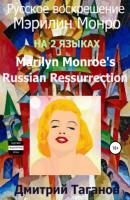Русское воскрешение Мэрилин Монро. На 2 языках. Дмитрий Николаевич Таганов
Чтение книги онлайн.

Читать онлайн книгу Русское воскрешение Мэрилин Монро. На 2 языках - Дмитрий Николаевич Таганов страница 12
Название: Русское воскрешение Мэрилин Монро. На 2 языках
Автор: Дмитрий Николаевич Таганов
Издательство: ЛитРес: Самиздат
Жанр: Учебная литература
isbn:
isbn:
Something that was painfully strained for months suddenly snapped and broke in him. He reached out his hand down to her bloody stain, but she at once threw herself back from his hand, and Rebrov saw closely her eyes. There was nothing in it but unconcealed stony fear. Rebrov let down the knife from his hand and it fell on the ground. Then he closed his face with both hands, turned and slowly walked away. Feet brought him down to the lake and he got into his boat. Something hard and tight suddenly squeezed his neck and a lump rose in his throat. He clamped both his hands to the eyes and his body violently shook all over. Soon his little brother came running after him. Rebrov leaned overboard, drew a handful of cold water and splashed it on his face.
Дома он собрал свою спортивную сумку, потряс за плечо, да так и не разбудил пьяного отца, и пошел в ночь за двадцать километров на станцию. Пассажирский поезд останавливался здесь раз в сутки. По четным дням – в сторону Питера, по нечетным – на Москву. Раннее утро оказалось нечетным, и Ребров уехал в Москву. Если бы утро оказалось четным, то поезд повез бы Реброва в Питер. Там жил и работал на заводе его дядька по матери, хороший и непьющий мужик. Он, когда приезжал в отпуск, всегда звал Реброва к себе, на свой завод.
Но выпал нечет. Ребров уехал в Москву и стал там сначала бандитом, а потом киллером. В свою деревню он никогда больше не вернулся.
At home Rebrov packed his sporting bag, tried to wake up his drunken father, but then hugged his brother and went in the light spring night to the railway station some fifteen miles away. Passenger train stopped there once a day. On even days of a month the train went to Sankt-Petersburg, and on the odd days to Moscow. If it would have had happened to be an even day the train would have taken Rebrov to Petersburg, where his uncle lived, a non-drinking cheery fellow. Every time he came for vacation, to see his sister when she was alive, he always lured Rebrov to come and work with him at metal works. However, early morning of that day in May happened to be odd. Rebrov went to Moscow, became there firstly a burglar, and then a professional killer. He never came back to his village.
4. Ленч / The Lunch
Левко выбрал для ленча китайскую кухню. На первое суп из ласточкиного гнезда, – это из маленьких рыбок, которые китайские ласточки натаскали, чтобы построить свое гнездо, и чем-то вкусным их склеили. Второе было проще: утка по-пекински с ростками бамбука. Личного повара Левко завел еще в девяностых, когда открыл свой первый банк. Но тогда это было по необходимости: в те лихие годы, чем реже банкир светился в людных местах, тем дольше мог прожить.
Levko had chosen Chinese cuisine for lunch with his partner. First dish was to be a swallow's nest, that’s a soup cooked of small fishes caught and brought by swallows to build their nests, glued together with something tasty. Second dish was simpler, the duck a la Peking with bamboo shoots. Levko hired his first private cook in the nineties when he founded his first bank. It was vitally sensible: in those wild years the less the banker showed up in crowded places, the longer he was expected to live.
Свой первый банк он назвал тогда, как азартный картежник, «Вист-кредит». Но тот его банк больше сам занимал, чем выдавал кредиты. А если и давал, только тем, кто вез в страну тряпичный «секонд-хэнд», да просроченные колбасы и консервы из чужих магазинов. Да и только потому, что те оборачивали его деньги за неделю. Главным делом этого банка, с дверью в подворотне, был отмывка преступных денег и перегонка их за границу, если этим рублям хотелось стать инвалютой. А еще обналичкой таких же преступно нажитых рублей, если они хотели тут пока и оставаться. Проблемы были только с чемоданами, чтобы возить туда-сюда эти миллиарды тех еще, «деревянных» рублей.
He named his first bank as a born gambler and reckless card player: Vist Credit. This bank, with the doors from a dirty backyard, did not deal in loans, but mostly had laundered criminal money. If Levko ever gave any loans then, that was to the traders who brought to the country second-hand clothes or long overdue sausages and canned food bought cheaply from Europe’s shops. That was quick and profitable turnover for his bank. But the main business of his bank was laundering criminal rubles and moving it abroad turned into hard foreign currency, minus, of course, a fat percent for his bank’s risk and trouble. Also, his bank transferred rubles from its accounts into paper cash keeping no record and trail, if the owners needed it for some shady and murky deals. That was even more illegal. Though, the problems were only with the suitcases to carry to and fro billions of those inflated and weak rubles, called then "wooden".
Еще Левко набил себе хорошо карманы на такой глупой затее, как чубайсовские приватизационные ваучеры, – если кто их еще помнит. Их автор подошел к СКАЧАТЬ